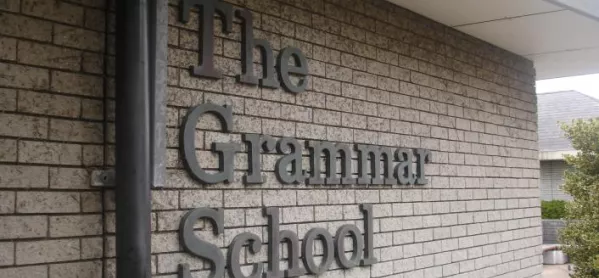The government’s plans to expand grammar schools are “unlikely to bring benefits for young people”, a major piece of research suggests.
Researchers from the UCL Institute of Education found that grammar school pupils do no better academically than similar pupils who attend non-selective schools.
And attending a grammar school has no positive impact on a teenager’s self-esteem, their aspirations for the future or their English vocabulary, the study shows.
Earlier this month, education secretary Damian Hinds announced a new Selective School Expansion Fund worth £50 million a year to allow existing grammar schools to expand, either by providing more places or by building new annexes. Critics say the plans are a sop to middle-class parents.
Professor John Jerrim, lead author of the study, said the findings undermine the case for grammar school expansion. “Our findings suggest that the money the government is planning to spend on grammar school expansion is unlikely to bring benefits for young people.
“Even those children who are likely to fill these new places are unlikely to be happier, more engaged at school or have higher levels of academic achievement by the end of Year 9.”
‘Inappropriate’ us of public funds
He pointed to a recent study conducted by Durham University, which found that grammar school pupils do no better in terms of achievement than their equivalent peers at non-selective schools, once factors such as background and previous attainment are taken into account.
“Almost all the research points in one direction so that, taken together, it suggests if there really is evidence-based policy there wouldn’t be this push for expansion,” he said.
Mary Bousted, joint general secretary of the NEU teaching union, said the money earmarked for the expansion of grammar school places was an inappropriate use of public funds “at a time when schools across the country are having to reach down the back of the sofa for spare change”.
She said: “There is not a shred of evidence that selective education provides academic benefit in the round, and the negative impacts on young people in selective areas who don’t get a place in a grammar school are well documented. The government has, once again, got its education priorities wrong.”
The researchers used data from the longitudinal Millennium Cohort Study, which tracks the lives of around 19,000 children born in the UK in 2000-01. They analysed data from 883 children in England and 733 children in Northern Ireland who had similar academic achievements at primary school and came from families with similar incomes and education levels.
They looked at the results of tests taken in English, mathematics, verbal and non-verbal reasoning at the ages of 3, 5, 7 and 11, as well as a vocabulary test at the age of 14, and compared results from those who went on to attend a grammar school and those who did not.
Children were also given a series of questionnaires at the ages of 11 and 14 to elicit their thoughts on mental health, engagement at school, wellbeing and interaction with peers.
Josh Hillman, director of education at the Nuffield Foundation, which funded the study, said of the findings: “In light of this evidence, it is increasingly difficult to understand the government’s rationale for spending money on expanding selective education rather than on improving education for all young people.”
Angela Rayner, Labour’s shadow education secretary, said it was time for prime minister Theresa May to ditch her “pet project”.
“Additional funding for grammar schools will do nothing to improve the outcomes of the children who attend them, but each new grammar school effectively creates new secondary moderns, a two-tier school system that robs the majority of children of the opportunities that they deserve.
“Instead of pushing ahead with this discredited and divisive policy, the Conservatives should give every child the support they need, by reversing their cuts to school budgets and giving our teachers the pay rise they deserve.”
A DfE spokesperson said: “We know selective schools provide an excellent education - in fact, research shows that pupils from disadvantaged backgrounds achieve better results in selective schools, and 98 per cent of them are rated ‘good’ or ‘outstanding’. We also know these schools are oversubscribed, with parents wanting their children to be able to access this form of education.
“We want more children from all backgrounds to have access to a world-class education, which is why all selective schools applying for funding to expand must not only be ‘good’ or ‘outstanding’, but must also make clear how they will increase their intake of disadvantaged pupils and work with local non-selective schools to improve outcomes for pupils of all backgrounds.”





